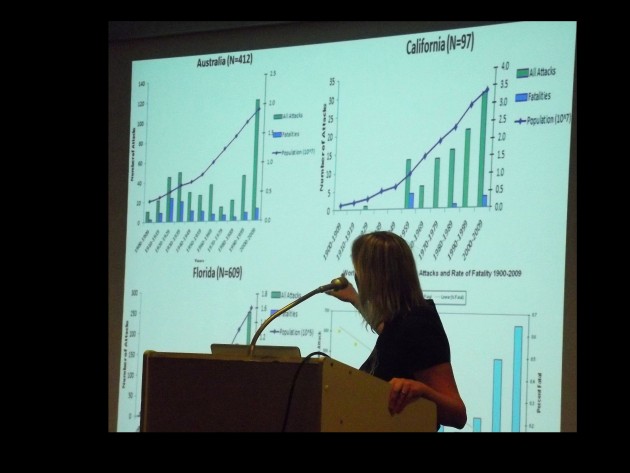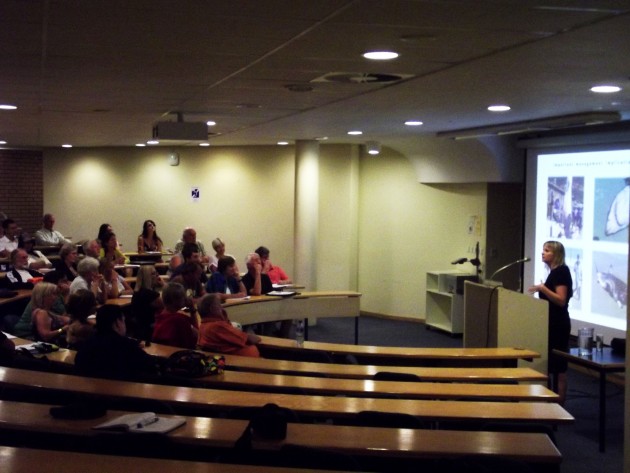Giving the science of Great White Sharks some bite!
Written by Jon Friedman
UCT Summer School 2013
Speaker: Alison Kock, Research Manager Shark Spotters
The second lecture in the 2013 UCT Summer School series under the topic of “Living With Great White Sharks In Cape Town” was delivered by course curator and regarded shark behaviourist and scientist Alison Kock. As the Research Manager at Shark Spotters (the very popular frontline in keeping the public informed as to great white shark behaviour along the False Bay coastline), Alison had promised course attendees the previous day that she would be releasing some very new and previously unreleased info at her talk today so the atmosphere in lecture hall three was thick with anticipation.
Headlining her lecture “ Science With Teeth”, Alison wasted no time in distinguishing between “toothless science” and the kind of science that is likely to impact lives. She acknowledged that there is so much misinformation out there as to why sharks bite people yet very little real science to explain it. She first offered us a glimpse into the possible reasons for shark attacks on humans over the years (in Cape Town between 1960 and 2012, only 29 bites were recorded, of which 6 were fatal), where factors such as global warming, depletion of prey, lunar phases and population growth are considered. She also got us thinking about aspects that are easy to dismiss when considering the natural behaviour of an apex predator in its natural environment, where a change in human behavioural patterns might be a more important factor in determining why sharks attack people; considering that there are more people making use of the ocean environment now than ever before.

Employing an arresting array of graphics, charts and thrilling videos (some never seen before) to highlight the pertinent facts of great white shark behaviour versus its impact on us, Alison was able to quickly paint a sympathetic portrait of the great white shark as a super predator who deserves our respect.
And then, the groundbreaking research that Alison had everyone waiting for with baited breath was the news that it is almost entirely female great white sharks that are likely to stray inshore along our False Bay coastline during the spring and summer months! Having tracked the movements of 56 great white sharks (of both sexes) in False Bay for nearly three years, all of the tagged sharks (with one exception) turned out to be females. This is exciting news and is important when considering the impact of great white shark management solutions in the future. But while one question has been answered, it would seem another has been posed: if the majority of great white sharks visiting our inshore areas are indeed female, where are all the males or where are they hiding at this time of year? Finding that answer will no doubt keep Alison and her team busy for some time yet.
Cape Town scientists studying the great white shark can indeed claim bragging rights to having pioneered much of the methodology and resulting data arising from the total amount of research being conducted.

To end her talk, Alison spoke of the work being done by her famous Shark Spotters in doing their level best to prevent any further attacks occurring in our waters, a task that mostly involves changing the behaviour of people, not sharks.
This was another fantastically informative lecture in the series of three that left all inspired by the work being done by Alison Kok and her team, both in and out of, the waters of False Bay.
A video of the talk can be viewed here
Images courtesy of Jon Friedman
